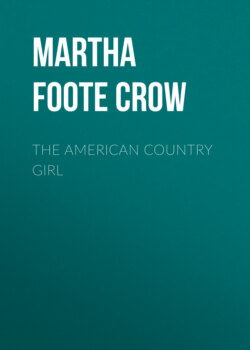Читать книгу The American Country Girl - Martha Foote Crow - Страница 13
На сайте Литреса книга снята с продажи.
ОглавлениеThe Country Girl is the life of the home. She is a companion for the parents and a playmate for the little brothers and sisters.
Or is she full of spirit and enthusiasm, a perfect dynamo of energy? Is she the life of the home, with a word and a joke for everybody and is she a perfect mischief among the other children? Is her face full of expression, with smiles and dimples all the time? Is she full of love and affection toward each member of the family, and endless in her devices for their comfort and entertainment? Is she a veritable steam engine to get the work done and equally a master hand at all kinds of games and plays, able to get up something in no time and carry out any kind of a scheme with nothing to do with? Does she sleep the very sleep of the dead the whole night long, and is she all day the widest awake being that can be found for miles around? Has she an appetite to startle one fully three times a day and even more often, if something good to eat is being made? In fine, is she receiving her share of possible growth? Is she having her chance to show all that she is able to become? And thus is she being happy? And also thus is she making the rest of the circle in the home that is at the center of the farmstead, happier than it could ever have been if she had not been there and had not been the fully developed girl that she is?
This is the question that seems most important at just this time. This is the problem on which light must be thrown.
It seems to be an important question for several reasons. It is said that the young men are showing their dissatisfaction with farm life by going away in large numbers to find occupation in the city; that the best and most energetic of the young men, those who would have been leaders for betterment in the general countryside, are found among those who desert the countryside, and that thus the farm community is depleted and deprived of good elements that it cannot well spare. The wind of destiny for woman that has swept through the country and the world during the last two decades or so, has penetrated the valleys where in seclusion the Country Girls have grown up, and has now whispered inspiration and courage into their ears, so that if they are dissatisfied with the conditions of their lives they will have the daring to go forth also, following their brothers, and to take up some industrial fortune in the city whither the bright star of independence beckons them. They are doing this already; and the news of it should make thoughtful people bestir themselves. There seems to be a great problem here, and the Country Girl seems to be at the heart of it. For if the rural question is the central question of the world, and if the social problem is the heart of the rural problem, and if the failure of the daughter's joy and usefulness threatens the farmstead,—then once more in the history of the world has the hour struck for woman; then does the welfare of the world depend upon her as much as did the life of the bleak New England shore depend on the health and survival of the Pilgrim Mothers?
Of course no one would wish to claim that the young woman in the farmstead is of more importance than other members of the home; but as a chain will break if one link fails, so the farmstead will be ruined if it lacks the cooperation of the daughter. She has, at least, a function all her own; and the happiness that comes through normal growth must be hers in order that she may fulfil her mission. The farmstead girl must take her place in the farmstead or the farmstead unit will lack one of its component parts and fall to pieces. It is her patriotic duty; it is her home and family duty; and it is her greatest happiness. The young woman on the farm must grow up with the idea that she is essential to the progress of country life and therefore of the national life, and that a career is before her just as much as if she were aiming to be an artist or a writer or a missionary. This purpose makes her life worth while. She must conserve her health for this; she must develop her powers for this; she must train herself heroically for this.
We are, then, face to face with the question, so important to us at the present moment, whether the daughter in the farmstead family is having her own full meed of happiness in her farm home or not. Has she the opportunity that is her right to grow and develop all her latent powers and to become the person that by all the gifts of nature she is capable of becoming?
